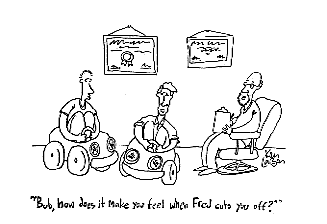go to WASHINGTON FREE PRESS HOME (subscribe, contacts, archives, latest, etc.)
May/June 2000 issue (#45)
|
|
They come in all shapes and sizes, models, years, colors. Cars have taken over the world, more or less. In 1896, while experimenting with the diesel engine, Henry Ford thought he was adding another convenience to the modern world. What he may not have anticipated was the trunk load of baggage his horseless carriage would accumulate along the highway of its evolution. People love their cars, but there is always a price for freedom: mechanics, maintenance costs, traffic jams, accidents, and bad drivers. These are the laments of many a car owner, a marred American Experience that follows after the elation of the purchase and the luster of the new car has worn off.
"I bought my hatchback for 1500 bucks. Usually I buy my cars on instinct, but this time I had a mechanic check it out and okay it as sound. Two days later I'm driving to Oregon for the weekend and I hear this clunk and the engine starts sounding funny. So I coast down the freeway ramp to the gas station and it turns out that the car threw a rod. I was in Federal Way when it happened and never made it to Portland, instead I took the bus back home to Seattle, bought some champagne along the way and spent the night sadly toasting the short life of my new car."
"When the transmission failed on my Mazda, the repair department told me that it would cost $2700 to replace. I argued that I had only 80,000 miles on the car so they decided to "goodwill" me a new transmission and just charge me $720 for labor. I was going to Ireland in two weeks and I could afford either the car repair or my trip. While I was at lunch a few days later, I bought a lotto ticket that won me an unbelievable $740. So, I was able to go to Ireland and get my car fixed. I don't have the car anymore because when they replaced the transmission, they forgot to add oil and the engine got trashed."
We all make mistakes, even mechanics. And surely mechanics get disgruntled with bad car owners, the kind that do their own faulty repair or who don't take care of their cars at all.
A friend of mine owned a 70s Falcon, three-on-the-tree, rusted. He asked me to take his car in to the shop to get a muffler change while he was out of town. I agreed, though with some trepidation having never mastered a stick let alone this shifting on the column business. Somehow I managed to bounce the Falcon down the street to the Midas shop, where, after putting it up on the lift, I and everyone else saw that the entire bottom of the car was hand wired to keep all the parts in place. I was embarrassed even though it wasn't my car, but I doubt the Midas people believed me.
Yet, there are other more insidious evils associated with cars: inclement weather, accidents. And surely pedestrians get annoyed and bicyclists get annoyed and drivers get annoyed with the "other driver". The driver who assumes the yellow light means "go faster". The driver that thinks merging onto I-5 is a perfect time to apply mascara. The driver who thinks driving 30 miles per hour over an icy bridge is a smart thing to do.
"We were driving to work one morning and ss usual, we took the Fremont Bridge to Northwest Portland. About half way across the bridge we hit a patch of black ice that put us in a 360 degree skid. We came out of the skid facing an oncoming semi that had just hit the ice and was starting to jack knife. The truck driver regained control but not before coming within a few feet of hitting us. I don't think I've ever been so scared as seeing that semi coming straight at us. It was like slow motion. Traffic was tied up on that bridge for two hours because of that accident and we were right in the middle of it (and really late for work)."
Those are the times the cell phone comes in handy.
"I don't use my cell phone regularly, only when it's an emergency and then I pull over to talk."
"I've been sitting at this espresso stand and at the last green light, I saw five SUVs round the corner, each driver chatting away on their cell phone."
"I want to be able to connect with my kids, especially if I'm out and they are home alone."
"I'm important."
Even Perry Mason had a car phone. But while the battle lines are being drawn for and against the use of cell phones while driving, there is an even bigger issue at hand. Parking. Parking used to be easy: leave home 20 minutes before the event, drive calmly through moderate and polite traffic, slide into an empty parking space in front of the venue. But things are different now. Life is harried, traffic is heavy and hardly polite and for many Washingtonians, the rhetorical question is not "what is my purpose in life?" but "where will I park?" And that question will not go away because the car, along with its idiosyncrasies, is here to stay.

|
go to WASHINGTON FREE PRESS HOME |